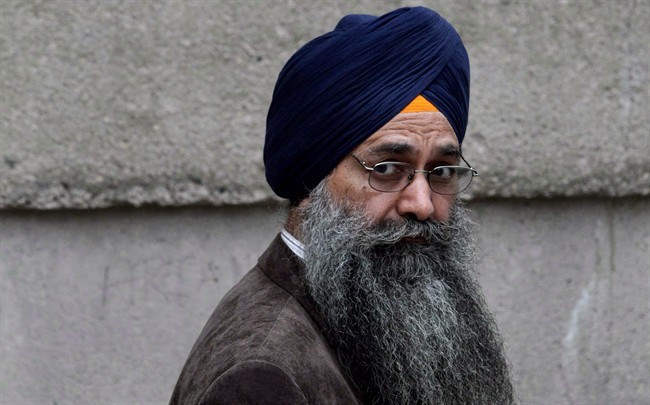VANCOUVER — The only man convicted in the 1985 Air India bombing no longer has to stay in a halfway house and can now live at his family home, the Parole Board of Canada has ruled.
Former Duncan electrician Inderjit Singh Reyat was released from prison a year ago, after completing two-thirds of his perjury sentence for lying at the trial of two co-accused who were later acquitted in the deadly terrorist attack.
At the time, the Parole Board of Canada imposed special conditions on Reyat, including that he must live in the halfway house in an unnamed B.C. community.
But on Jan. 27, board member Laura Hall removed that special condition after getting a recommendation from Correctional Service Canada.
She said Reyat has been abiding by all of his special conditions over the last year.
“There has been no evidence of communication with any negative associates who may hold extremist views or be involved in political activity,” Hall said in her decision.
“There is no evidence that you continue to associate with your co-accused and you have indicated that you have no desire to establish contact. You now express strong views against violence. You spend time at your family home.”
Reyat’s risk to reoffend is now low, she said.
“However, if there were a threat to your Sikh cause, your risk for future-based group violence is high. There is no information that indicates your political cause is under threat,” Hall said.
Before Reyat’s perjury conviction, he pleaded guilty to manslaughter for his role in the June 23, 1985 bombing of Air India flight 182, which killed all 329 aboard.
He was sentenced to five years.
But when he was called as a Crown witness against co-accused Ripudaman Singh Malik and Ajaib Singh Bagri, Reyat lied repeatedly, leading to his perjury charge in 2006, the year after both men were acquitted.
In her parole decision, Hall also noted that Reyat was so loyal to Malik and Bagri “that you were willing to lie for them in court.”
“As a result of your committing perjury, the co-accused were not convicted of any criminal offences,” she said.
Anil Singh Hanse, an Australian whose father Narendra piloted the ill-fated flight, said he was disturbed by the news that Reyat would be free to live at home.
“I just feel like I have been kicked in the head once more by Canada and the system,” Hanse said in an email.
“This is a positive message for anyone wanting or plotting to do any untoward attacks. Crazy, I tell you —just crazy.”
Reyat was also found guilty of manslaughter in an earlier trial for building the bomb that exploded the same day at Tokyo’s Narita Airport, resulting in the deaths of two baggage handlers. He got a 10-year sentence.
The two bombings were plotted by B.C. Sikh separatists who targeted India’s national airline to retaliate for the Indian Army’s raid a year earlier on the Golden Temple — Sikhism’s holiest shrine — in Amritsar.
The mastermind in the plot, Babbar Khalsa leader Talwinder Parmer, was tortured and killed by Indian police in 1992 after he fled B.C.
While Reyat will now be able to live at home, other special conditions remain in place until the end of his sentence in August 2018.
He is not allowed to participate in political activities for any organization, can’t contact his victims’ families and must stay away from criminals, extremist propaganda and anything that could be used to build an explosive device.



